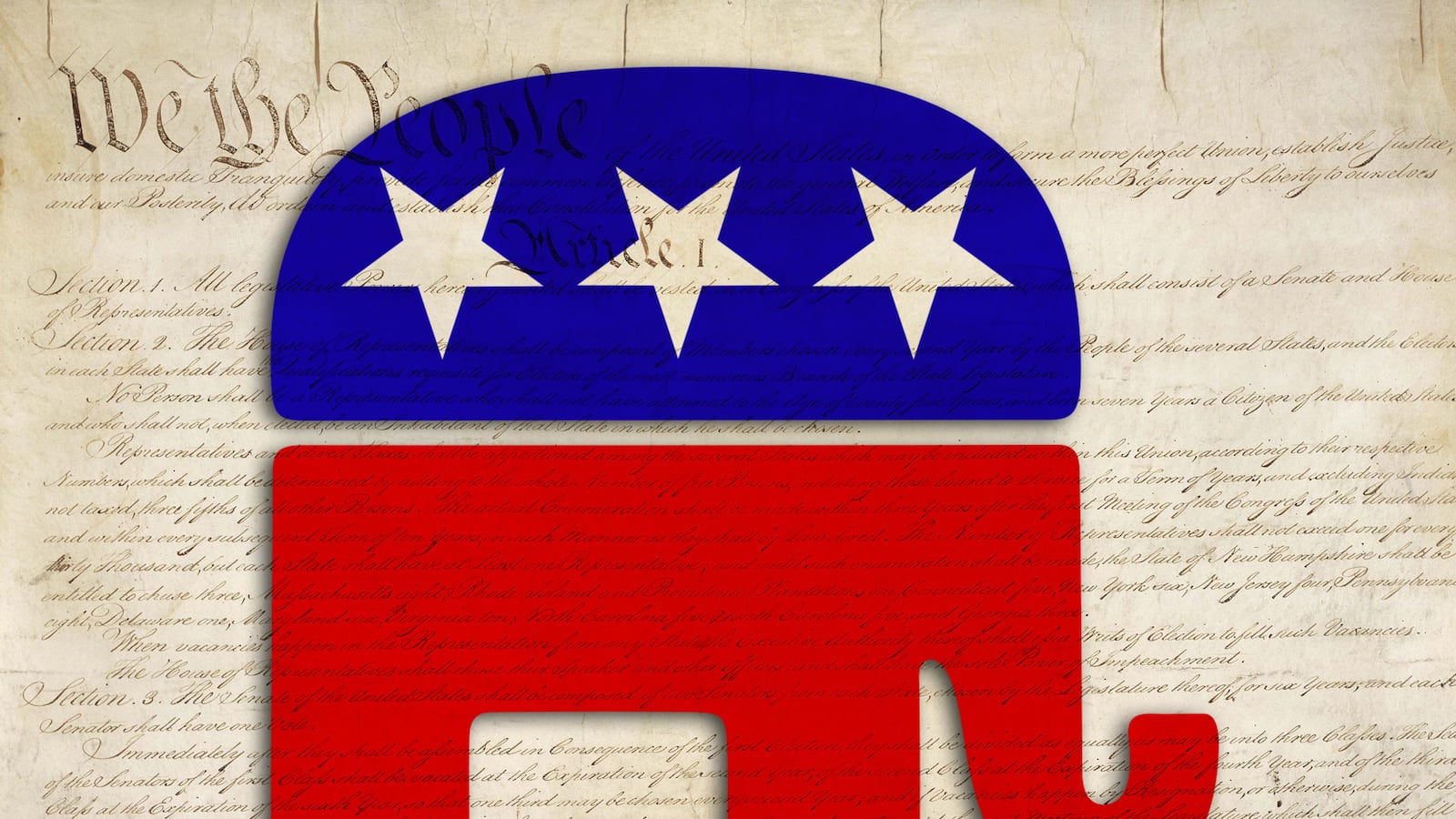Decades from now, we will remember the congressional elections in 2010 and 2012 as marking the introduction to Congress in large numbers of political figures sympathetic to the Tea Party’s political vision. But we will also remember those elections for marking the beginning of the national political careers of two bright, talented, and young Republican senators—Mike Lee from Utah and Ted Cruz from Texas—with substantial prior involvement in and commitment to the conservative constitutional movement. With no Democratic senators with similar ties to the liberal constitutional movement, this has made the Senate a place for asymmetrical constitutional warfare. Nothing better symbolizes this than Sen. Lee’s new book on the Constitution, The Lost Constitution.
Both conservatives and liberals have their own lawyers and organizations dedicated to pursuing their respective visions of what the Constitution should mean. Both Sen. Cruz and Sen. Lee’s connections to the conservative constitutional movement are wide, deep, and long-standing, and have shaped what these senators have advocated during their political careers.
Cruz was elected after Lee, but has become the more famous of the two senators, helped by his decision to run for the Republican presidential nomination this year. After starring at Harvard Law School, Cruz clerked for Judge Michael Luttig of the United States Court of Appeals for the Fourth Circuit. Judge Luttig was perhaps the most famous conservative federal appellate judge in the country at the time, having previously worked to ensure Clarence Thomas’s confirmation to the Supreme Court while Luttig worked in the Justice Department for President George H.W. Bush. Before stepping down as a federal judge, Luttig sent 40 former clerks to clerk on the Supreme Court, with a full 33 of them clerking for Justices Antonin Scalia or Thomas. Cruz himself clerked for a different but equally connected conservative justice, the late Chief Justice William H. Rehnquist.
After his clerkship with Rehnquist, Cruz became the only associate at a powerhouse conservative law firm, Cooper, Carvin & Rosenthal. He then became a leading legal figure working in different positions for President George W. Bush. Cruz eventually became the solicitor general of Texas, arguing for a conservative vision of the Constitution on behalf of the conservative attorney general of Texas at the time, Greg Abbott, who is now the state’s governor.
For several years, Cruz has used the microphone provided by his position as a candidate for the Senate and then as an elected senator to argue for a conservative vision of the Constitution. During his 2012 Senate campaign, The New York Times reported that “[i]n nearly every speech Ted Cruz delivers in his United States Senate campaign, he repeatedly mentions the United States Supreme Court.” Cruz put his role as a lawyer in defending religious freedom or attacking an overzealous federal government front and center in his campaign. And in the Senate—as his homepage proudly notes—he has made pursuing his conservative vision of the Constitution a central part of his agenda.
While Sen. Lee is less nationally known, his connections to the conservative constitutional movement are just as intense. His father was Rex Lee, a solicitor general for President Ronald Reagan and a tireless advocate for conservative causes in federal courts. Lee clerked for Judge Samuel Alito when Alito was a judge on the United Court of Appeals for the Third Circuit, and again for Alito after he became a conservative leader on the Supreme Court. Sen. Lee’s brother is a conservative justice on the Utah Supreme Court.
While Lee’s connections to the conservative constitutional movement go back several decades, his book is important—and newsworthy—because it marks his entrée onto the national stage as another powerful voice (in addition to Cruz) arguing for the vision of the Constitution shared by the conservative constitutional movement that helped professionally raise him. The book highlights a few parts of the Constitution whose principles that Lee believes have been neglected by recent (usually liberal) actions by the federal government. If we study the history—according to Lee—we will see that modern constitutional interpretations are liberal perversions of more conservative-oriented original understandings of the Constitution.
Each chapter in the book is meant to be a discussion of the history of a provision of the Constitution—some histories that Lee admits to improvising to fill in missing details—and an analysis of how our modern constitutional understandings have departed from that history. For instance, Lee discusses how the Constitution places the legislative power solely in the Congress, but most policy decisions now are made by administrative agencies. Or as Lee puts it, “Congress has gotten addicted to outsourcing.” He also discusses how “the First Amendment” was not understood to be “completely neutral between religion and atheism” but now that has become a more accepted position.
Lee’s book is not important merely because it adds another conservative senator’s voice to our constitutional discussions, but also because that voice is gentler and more substantive than Cruz’s. Where Cruz often uses Tea Party rhetoric, Lee tries to make readers “feel as if you were right there at the pivotal moments of history.” His versions of history may be debatable—and they clearly lean conservative—but just as clearly Lee intends his book to be more serious and substantive than Cruz’s utterances.
Curiously, all the talk and energy devoted to the Constitution by right-leaning senators has no equivalent among senators on the left. Many Democratic senators have legal credentials every bit as fancy as Lee’s and Cruz’s. For instance, Sen. Michael Bennet from Colorado and Sen. Richard Blumenthal from Connecticut were both editors-in-chief of the Yale Law Journal. Upon graduating, however, neither Bennet nor Blumenthal worked for or with the touchstone individuals and organizations of the liberal constitutional movement as Cruz and Lee did for the conservative movement. Cory Booker is a Rhodes Scholar and Yale Law School graduate, but quickly went into local politics in Newark before becoming a senator from New Jersey. Charles Schumer was an honors graduate of Harvard Law School, but shortly after he graduated from law school he ran for the New York state legislature.
Most Americans know—and like—the settled reality that the Supreme Court has the final word in interpreting the Constitution. But the Supreme Court does not utter many words in interpreting the Constitution. It decides fewer than 100 cases per year, and at most a few each year are about constitutional issues the public follows. The result is that more Americans can name two of the seven dwarfs than two of the nine Supreme Court justices.
With this big of a public gap for constitutional discussion available, there is room for political figures to walk in and shape how Americans think about the Constitution. Lee’s new book is likely to do just that—and to be met with no equal and opposite force from the other side of the constitutional aisle. If we want robust constitutional discussions outside of the courts, we need more figures on the political left like Senator Lee and more books like his new book.
David Fontana is Associate Professor of Law at George Washington University School of Law.






